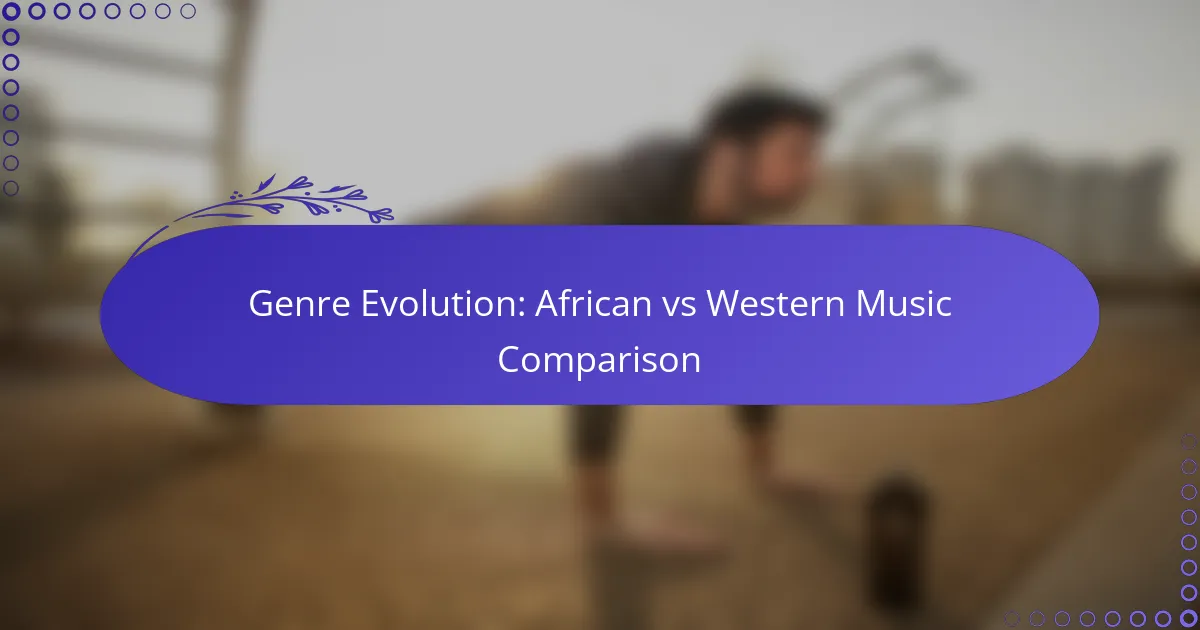The evolution of music genres in Africa and the West showcases a fascinating interplay of cultural influences and historical contexts. African music is characterized by its intricate rhythms and diverse instrumentation, deeply rooted in traditional practices and shaped by colonial and global influences. In contrast, Western music reflects a blend of classical traditions, jazz, blues, and technological advancements, resulting in a rich tapestry of contemporary sounds. Understanding these differences offers valuable insights into the unique identities and artistic expressions of each region.
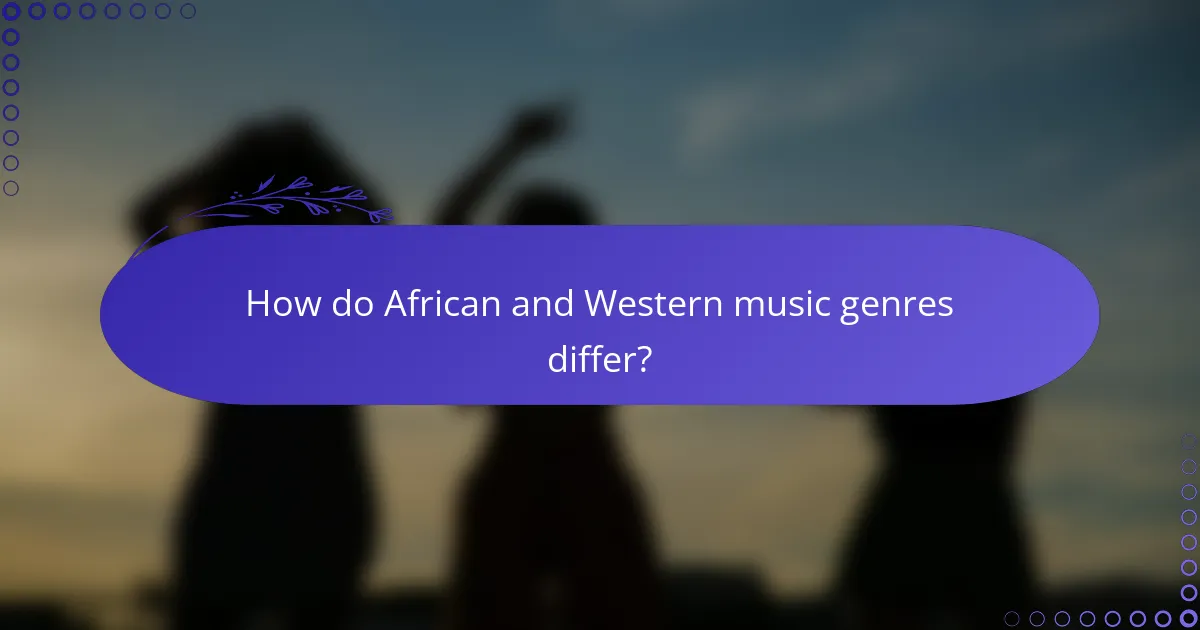
How do African and Western music genres differ?
African and Western music genres differ significantly in their rhythmic structures, instrumentation, cultural influences, songwriting techniques, and performance styles. These differences reflect the unique histories, traditions, and social contexts of each region.
Rhythmic structures
African music often features complex polyrhythms, where multiple rhythms are played simultaneously, creating a rich tapestry of sound. In contrast, Western music typically relies on simpler, more straightforward rhythmic patterns, often based on a 4/4 time signature.
This complexity in African rhythms allows for a greater variety of expression and improvisation, while Western rhythms tend to emphasize a steady beat, making them more accessible for mainstream audiences.
Instrumentation
African music utilizes a wide array of traditional instruments, such as the djembe, kora, and mbira, which contribute to its distinctive sound. These instruments are often handmade and vary greatly between regions.
Western music, on the other hand, frequently employs electronic instruments and standardized orchestral components, such as guitars, pianos, and synthesizers. This reliance on technology can lead to a more polished sound but may lack the organic qualities found in African music.
Cultural influences
African music is deeply rooted in community and cultural rituals, often serving as a medium for storytelling and social commentary. It reflects the diverse ethnic backgrounds and traditions across the continent.
Western music, influenced by various historical movements like the Renaissance and the Industrial Revolution, often emphasizes individual expression and commercial success. This focus can lead to a wide range of genres but may sometimes prioritize marketability over cultural significance.
Songwriting techniques
In African music, songwriting often involves collaborative efforts, with communal input shaping the final piece. Lyrics may be in local languages and often address social issues, history, or spirituality.
Western songwriting tends to be more individualistic, with a focus on personal experiences and emotions. Songwriters often follow established structures, such as verses and choruses, which can lead to formulaic compositions.
Performance styles
African music performances are typically vibrant and interactive, encouraging audience participation through dance and call-and-response techniques. This creates a dynamic atmosphere that fosters a sense of community.
Western performances, while also engaging, often focus on the artist’s individual expression and stage presence. Concerts may prioritize visual spectacle and sound engineering, sometimes at the expense of audience interaction.
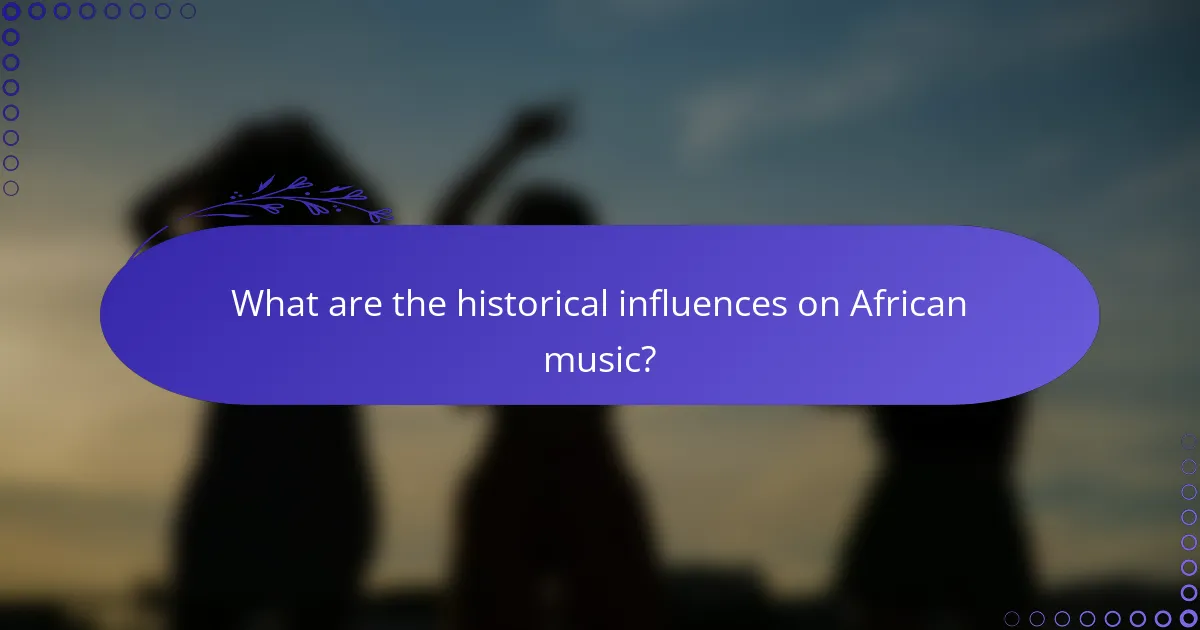
What are the historical influences on African music?
African music has been shaped by a variety of historical influences, including colonialism, traditional tribal practices, and the effects of globalization. These factors have contributed to the rich diversity and complexity of musical styles across the continent.
Colonial impact
The colonial period significantly altered African music by introducing Western musical instruments and styles. European colonizers often suppressed indigenous music, leading to a blending of traditional African rhythms with Western genres such as jazz and blues.
This fusion resulted in new musical forms, such as highlife and Afrobeat, which incorporate both African and Western elements. The legacy of colonialism is still evident in contemporary African music, where artists often navigate the balance between tradition and modernity.
Traditional tribal practices
Traditional tribal practices remain a cornerstone of African music, with each ethnic group contributing unique sounds and rhythms. Music is often intertwined with cultural rituals, storytelling, and communal celebrations, serving as a vital means of preserving history and identity.
Instruments like the djembe, kora, and mbira play crucial roles in these practices, showcasing the diversity of musical expression across different regions. Understanding these traditions is essential for appreciating the depth of African music today.
Globalization effects
Globalization has dramatically influenced African music by facilitating the exchange of ideas and styles across borders. Artists now have access to international platforms, allowing them to reach wider audiences and collaborate with musicians from various genres.
This has led to the emergence of hybrid genres, such as Afro-pop and reggaeton, which blend African sounds with global music trends. However, globalization also poses challenges, as some traditional forms risk being overshadowed by more commercialized styles.
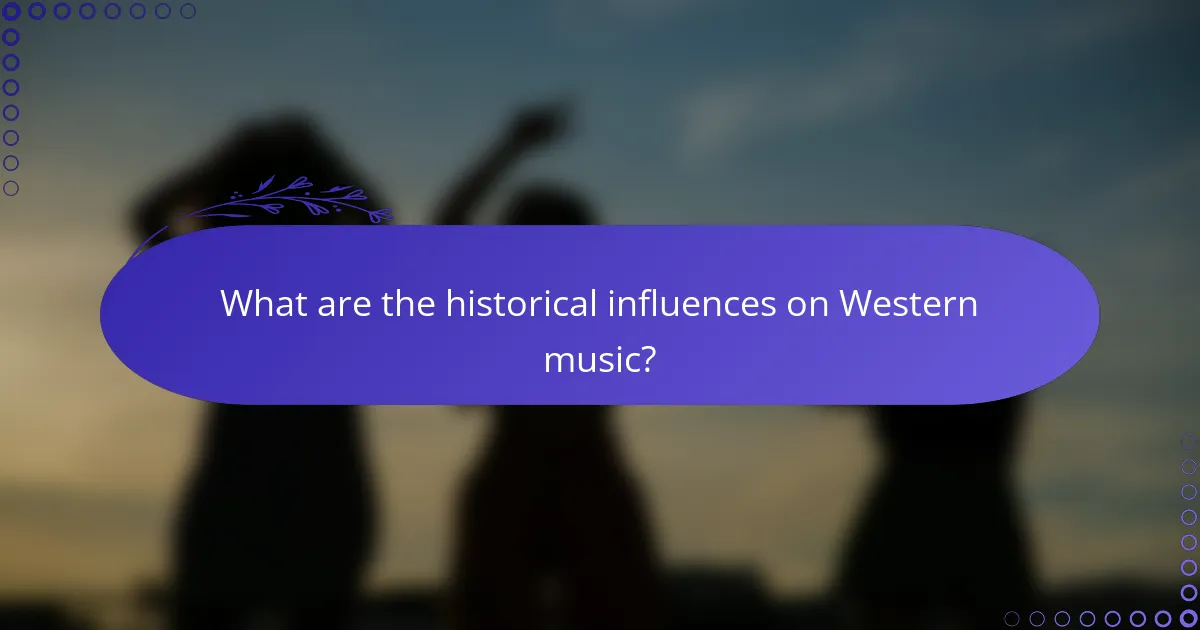
What are the historical influences on Western music?
Western music has been shaped by various historical influences, including European classical traditions, the evolution of jazz and blues, and advancements in technology. These elements have contributed to the diverse soundscapes and genres present in contemporary Western music.
European classical roots
The foundation of Western music is deeply rooted in European classical traditions, which date back several centuries. Composers like Bach, Mozart, and Beethoven established key principles of harmony, melody, and form that continue to influence modern music.
These classical roots introduced structured compositions and orchestration techniques that have been adapted across genres. The use of scales, chords, and musical notation from this period laid the groundwork for future developments in Western music.
Jazz and blues evolution
Jazz and blues emerged in the late 19th and early 20th centuries, primarily from African American communities. These genres introduced improvisation, syncopation, and expressive vocal techniques, significantly altering the landscape of Western music.
The fusion of jazz and blues with other styles led to the creation of new genres such as rock and roll and rhythm and blues. This evolution reflects the cultural exchange and social movements that shaped American music during this period.
Technological advancements
Technological advancements have played a crucial role in the evolution of Western music, particularly in the 20th and 21st centuries. The introduction of recording technology, synthesizers, and digital audio workstations has transformed how music is produced and consumed.
These innovations have made music more accessible, allowing artists to experiment with new sounds and reach wider audiences. The rise of streaming services further revolutionized distribution, changing how listeners engage with music today.
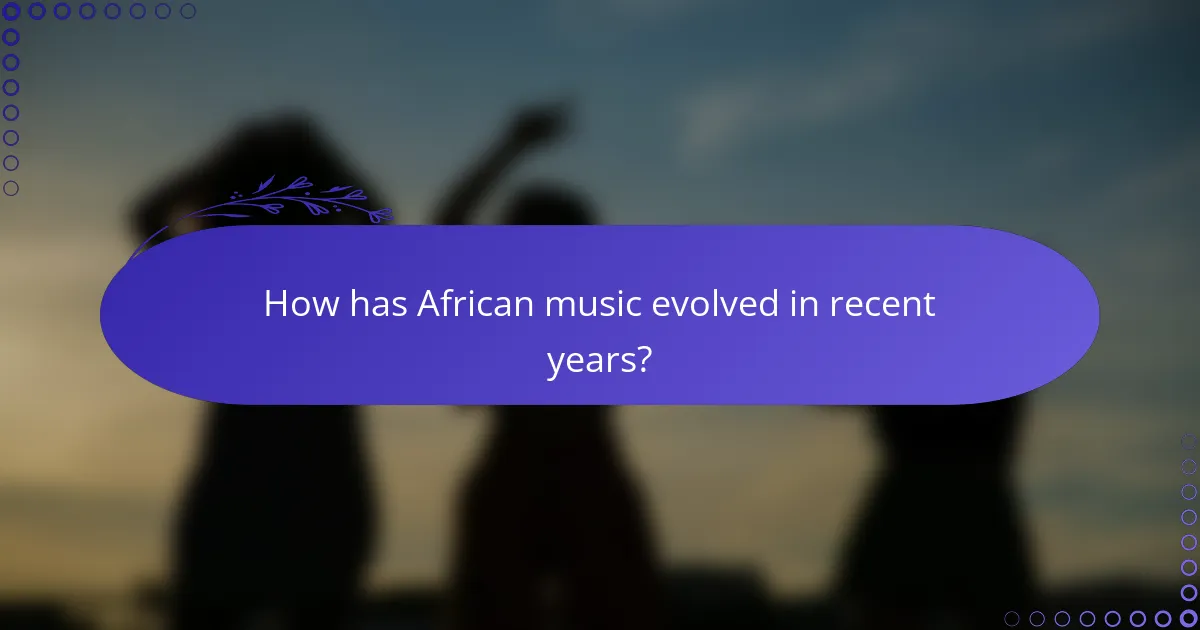
How has African music evolved in recent years?
African music has undergone significant transformation in recent years, influenced by globalization and technological advancements. Traditional sounds are blending with contemporary styles, creating a rich tapestry of genres that resonate both locally and internationally.
Fusion with pop genres
The fusion of African music with pop genres has led to the creation of new sounds that appeal to a broader audience. Artists are incorporating elements of hip-hop, R&B, and electronic music, resulting in innovative tracks that maintain African cultural roots while reaching global markets.
This blending often involves the use of traditional instruments alongside modern production techniques, making the music both familiar and fresh. For example, artists like Burna Boy and Wizkid have successfully merged Afrobeats with pop, gaining international acclaim.
Rise of Afrobeats
Afrobeats has emerged as a dominant genre, characterized by its infectious rhythms and catchy melodies. This genre combines various African musical styles with influences from jazz, funk, and hip-hop, creating a vibrant sound that has captivated listeners worldwide.
The popularity of Afrobeats has surged, particularly in urban areas across Africa and among the African diaspora. Festivals and concerts dedicated to Afrobeats are now common, showcasing both established and emerging artists, and contributing to the genre’s growth.
Global collaborations
Global collaborations have become a hallmark of African music’s evolution, allowing artists to reach new audiences and share their culture. Collaborations often feature artists from different continents, blending diverse musical styles and creating unique sounds.
Notable partnerships, such as those between African artists and Western musicians, have resulted in chart-topping hits and increased visibility for African music. These collaborations not only enhance the artists’ profiles but also foster cultural exchange, enriching the global music landscape.
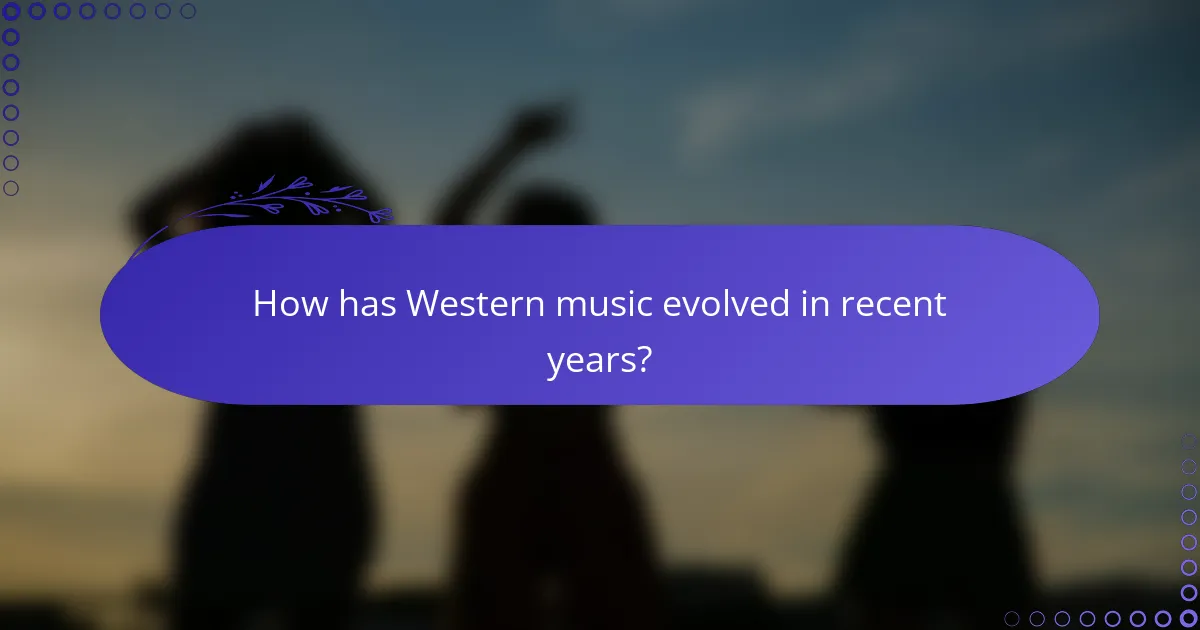
How has Western music evolved in recent years?
Western music has undergone significant evolution in recent years, characterized by the integration of diverse genres and the influence of technology. Key trends include the rise of hip-hop, the impact of streaming platforms, and the blending of musical styles.
Incorporation of hip-hop
The incorporation of hip-hop into mainstream Western music has transformed the soundscape, with artists from various genres adopting its rhythmic and lyrical styles. This genre has influenced pop, rock, and even country music, leading to collaborations that blend these distinct sounds.
For example, artists like Lil Nas X have successfully merged hip-hop with country, creating hits that resonate across diverse audiences. This trend reflects a broader acceptance of hip-hop culture and its artistic expressions within the Western music industry.
Streaming impact
Streaming services have revolutionized how music is consumed, allowing listeners to access vast libraries of songs instantly. Platforms like Spotify and Apple Music have changed the traditional music distribution model, enabling artists to reach global audiences without the need for major record labels.
This shift has led to increased competition among artists, as they must now engage listeners quickly to stand out in crowded playlists. Additionally, the data-driven nature of streaming allows artists to tailor their music to audience preferences, influencing songwriting and production choices.
Genre-blending trends
Genre-blending has become a hallmark of contemporary Western music, with artists frequently crossing traditional boundaries to create innovative sounds. This trend allows for a richer musical experience and attracts diverse fan bases.
Notable examples include the fusion of electronic music with rock or the combination of R&B with pop elements. Such collaborations not only expand artistic expression but also reflect the multicultural influences that shape modern music, making it more accessible and relatable to a wider audience.
